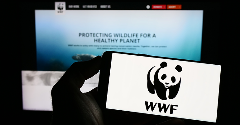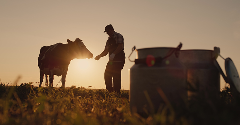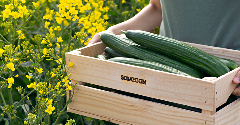News
WWF report slams Europe’s damning effect on the global food system
26 Aug 2022
Europe may not be helping, but in fact hindering the global food system by inciting gross environmental, societal, and fiscal harm, a recent WWF report shows. Consumers however are hungry for change.
A common claim amongst agricultural interest groups, policy makers and the media alike has long been that Europe is the cornerstone of global food production. Yet as globalisation continues to rapidly advance across the world, and new players and cracks emerge, does this belief still ring true?
From an economic standpoint, there is no denying that as the world’s largest exporter of agri-food products, the EU takes top spot. However, when we analyse Europe’s contribution to the nutritional wellbeing of the global food system, the picture looks very different.

Europe’s trade deficit
When it comes to protein and calories, the EU has a significant trade deficit, the latest report from environmental non-profit, the World Wide Fund for Nature (WWF) shows. Measuring agri-food trade through a lens of nutritional, rather than financial benefit to the world’s population, the WWF says that the economic surplus on Europe’s end only serves to disguise a nutritional deficit for many less advantaged world economies.
In numerical terms, the value of exported food and agricultural products from the EU in 2020 totalled €184 billion, compared to imports of €122 billion. This results in a significant agri-food surplus of €62 billion. While clearly beneficial to the EU economy, Europe’s method of importing low-value raw ingredients such as fruits, nuts, spices, and coffee, and exporting high-value products in exchange, notably wine and pork products, offers little else to the global food chain, says the WWF.
The EU relies heavily on imports to feed its population. So much so that over one tenth of the calories, and a quarter of the proteins consumed in Europe are reliant on imports, findings from a report by the Institute for Sustainable Development and International Relations (IDDRI) show. This demand results mainly from the high percentage of processed foods and animal products that are prevalent in the typical European diet.
Importing crops such as soy and oilseed to feed livestock, can be seen as calorie intensive and as an unsustainable use of resources by the EU, in relation to world’s growing population.
Yet this is just one of a host of issues associated with the EU’s role in the global food ecosystem, according to the WWF.
“The facts and figures in the WWF report speak for themselves. In fact, we said the same in a blog about the Farm to Fork Strategy we published last year together with experts from other civil society organisations, where we wrote – a bit provocatively – that “unless the world is feeding itself on spirits, wine and cheese, [the idea that Europe is ‘feeding the world’] is no longer true,” Camille Perrin, Senior Food policy officer at BEUC, The European Consumer Organisation, said.
 ©Adobestock/raland
©Adobestock/raland
The European diet is driving deforestation
As the second-largest importer of agricultural commodities associated with deforestation (16%) after China (24%), the EU has a significant environmental footprint.
Between 2005 and 2017, the production of agricultural commodities for the EU market was responsible for 40% of the EU’s annual emissions and resulted in the deforestation of some 3.5 million hectares of forest, WWF research shows.
The largest drivers of this, soy and palm oil, are key elements in the production of animal products for consumption by European consumers. Despite the obvious environmental impacts such as climate change and loss of biodiversity, deforestation for the purpose of food production also greatly threatens the livelihoods and wellbeing of local communities.
Although EU policy is becoming more stringent around activities of food manufacturers relating to deforestation – in 2021, the European Commission proposed a regulation to minimise EU-driven deforestation and forest degradation – more needs to be done to protect the affected communities.
“EU action on its role in driving global deforestation is important, but EU policymakers should also be concerned about ensuring European markets are not fuelling the displacement of Indigenous Peoples from their lands,” said Puyr Tembé, executive coordinator of the Pará State Federation of Indigenous Peoples (FEPIPA) in Brazil.
The EU is creating off-balanced agri- & aquaculture sectors
The EU’s livestock sector is another area of the food system, which is tied to gross environmental harm, says WWF.
Not only is livestock a significant source of greenhouse gas emissions, but Europeans today are consuming twice as much meat as is recommended by health authorities, resulting in an oversupply for the current demand. The result is an off kilter global farming sector.
Aside from meat imports, the EU depends on imported fertilisers such as potassium (85%) and phosphate (68%) to grow animal grain, which are used in the raising of livestock. The use of such fertilisers leads to severe environmental impacts across the globe, including water and air pollution, increased greenhouse gas emissions, and soil acidification.
The trend remains when we look at seafood too. Europe imports close to twice as much seafood as it produces each year, exacerbating the effects of overfishing, which threaten global marine ecosystems and the vast populations who rely on them to live.
The need to tackle waste at the farm-level
Arguably one of the hardest pills to swallow, of the food produced and imported by the EU, tens of millions of tonnes are wasted each year. Up to 40% of food produced worldwide is never consumed, around 88 million tonnes annually of which is within the EU.
Perhaps surprisingly, a large proportion of this waste, equivalent to 15% of total food production, occurs in industrialised regions such as Europe and North America, at the farm level. This is a part of the food chain in which waste has traditionally been overlooked yet can no longer be ignored.
Consumers are demanding more sustainable food systems
The silver lining in Europe’s food consumption problem? Consumers are increasingly demanding change. Three in five (61%) out of 11,000 surveyed in an WWF-led initiative Eat4Change reported their efforts to choose foods that are less harmful to the environment, yet only 46% are confident in doing so.
The same survey found that almost three quarters (74%) of Europeans agree that we should eat food that is better for the environment, while over half (53%) support initiatives to increase the sustainability of the food chain such as incentivising farmers via subsidies.
These changing attitudes are already being reflected in the EU’s growing organic food market, which grew 15.1% and hit record highs of €44.8 billion in 2020.
What needs to be done?
Nevertheless, much more can and should be done before the assumption can rightly be made that ‘Europe feeds the world.’
“This report is a clear wake-up call that Europe building a sustainable food system can benefit its citizens and the rest of the world alike. For this to happen, we must produce and consume differently,” Perrin said.
“On the production side, it means greening agriculture with less pesticides and fertilisers and producing better – hence less – animal source foods. On the consumption side, it means cutting food waste and making it easy for consumers to adopt healthy, more plant-based diets which are also good for the planet.”
Some of the key steps the EU can take to contribute to creating a more sustainable food system include reducing the consumption of animal products, developing less harmful aquaculture and seafood consumption, adopting largely plant-based diets, and drastically limiting food waste, the report outlines.
All of this and more must happen both at speed and scale to incite tangible change. A large proportion of this change can be driven via a bottom-up approach against large corporates, led by the likes of consumers, activists, and policy makers.
“The European Commission can no longer shy away from taking decisive action to address the environmental and social impacts of our food consumption […] Now is the time to tackle the deep-rooted problems at the core of how we produce and consume food,” said Jabier Ruiz, senior policy officer for agriculture and food, WWF EU.
Related news

Soy story: WWF scores UK supermarkets on sustainability efforts
12 Nov 2025
WWF has published its latest “Soy Scorecard”, ranking UK supermarkets’ efforts to combat deforestation and land conversion in their soy supply chains.
Read more
Standing Ovation and Bel scale up casein production from dairy co-products
11 Nov 2025
Foodtech company Standing Ovation has partnered with cheese specialist Bel Group to manufacture dairy serums for industrial-scale casein production via precision fermentation.
Read more
New UPF standard hoped to offer consumers ‘coherence and clarity’
10 Nov 2025
Ingredients companies are being urged to enter “a new era of partnership and innovation” following the launch of the industry’s first non-UPF verification scheme.
Read more
Whistleblowers accuse UK meat industry of promoting cheap, unsustainable supply
7 Nov 2025
An anonymous group of industry insiders has accused the UK’s biggest food companies of systematically driving down meat quality and welfare standards.
Read more
Bord Bia presents Irish dairy ingredient suppliers at Fi Europe
6 Nov 2025
Dairygold Co-operative Society, The Carbery Group, and Ornua Co-operative: Meet with sustainable producers of Irish dairy ingredients at Food ingredients Europe 2025, Hall 7.2 Stand M18.
Read more
AI attraction means foodtech startups must ‘prove’ rather than ‘promise’
4 Nov 2025
Reports suggest that artificial intelligence (AI) is sucking investment from foodtech and agritech, but investors say the picture is complicated.
Read more
Penguin and Club bars no longer classed as chocolate
30 Oct 2025
Penguin and Club bars can no longer be classified as chocolate after the pladis-owned McVitie’s brands turned to cheaper alternatives amid the ongoing cocoa crisis.
Read more
Could plant-based protection replace plastic packaging?
29 Oct 2025
Swedish foodtech company Saveggy has launched an additive-free plant-based protection for cucumbers, offering a waste-free packaging solution for fruit and vegetables.
Read more
Does promoting protein content push up plant-based sales?
27 Oct 2025
Promoting the protein content of meat-free products is a more effective sales strategy than adding carbon labels, a study of UK bakery chain Greggs suggests.
Read more
Amazon Grocery launch aims to balance quality with affordability
22 Oct 2025
Global e-commerce giant Amazon has introduced a new private-label food brand, combining existing Amazon Fresh and Happy Belly products with new everyday items.
Read more